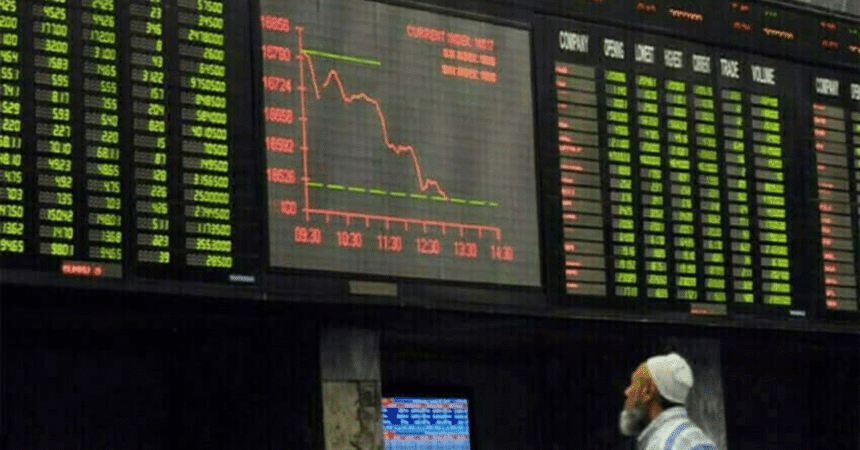The Pakistan Stock Exchange (PSX) has witnessed a remarkable surge, reaching an all-time high after the International Monetary Fund (IMF) approved a crucial loan program for the country. The KSE-100 Index rose sharply by 450 points, hitting a record level of 82,700 points during trading on Thursday. This significant milestone reflects renewed investor confidence and optimism regarding Pakistan’s economic outlook.
The recent approval of a $7 billion loan under the IMF’s Extended Fund Facility (EFF) is being hailed as a pivotal moment for Pakistan’s financial health. With an immediate release of nearly $1 billion, the funds are aimed at addressing pressing economic challenges and restoring macroeconomic stability in the country. As a result, the stock market opened with an impressive increase, adding over 600 points right at the start of trading.
Market analysts have pointed to several factors contributing to this bullish sentiment. The IMF’s support is anticipated to enhance liquidity in the market, paving the way for necessary economic reforms that can strengthen Pakistan’s financial framework. The optimism surrounding the loan approval has also led to heightened trading activity, further driving the index upwards.
Context of the IMF Loan Approval
On Wednesday night, the IMF Executive Board officially approved the loan, outlining a 37-month program designed to bolster Pakistan’s economic position. The decision comes at a critical juncture for the country, which has faced a myriad of economic challenges in recent years, including soaring inflation and a struggling currency. The loan is seen as a vital lifeline that can help Pakistan navigate its economic turbulence.
The IMF highlighted that Pakistan’s economy had demonstrated signs of recovery, with the growth rate reaching 2.4% in the last fiscal year. This modest growth was credited to robust performance in the agricultural sector and the implementation of effective fiscal and monetary policies, which helped in stabilizing the current account deficit. These developments have resulted in improved foreign exchange reserves and a notable decline in inflation, now reported to be in single digits.
Stock Market Reaction
The immediate aftermath of the IMF announcement was electric on the trading floor. As the markets opened, the KSE-100 Index saw an impressive increase, peaking at one point above 83,000 points before stabilizing around the 82,700 mark. This surge marks a significant recovery for the PSX, which has faced volatility in recent months due to economic uncertainties.
Investor enthusiasm was palpable, with trading volumes soaring as more investors flocked to take advantage of the bullish market conditions. The approval of the IMF loan has not only inspired confidence among local investors but has also attracted foreign investment, further bolstering market activity.
Analysts noted that the bullish trend is likely to continue in the coming weeks as the market absorbs the implications of the IMF support. They emphasized that sustained momentum will depend on the government’s commitment to implementing the necessary reforms outlined in the IMF program.
Government’s Response to the IMF Support
In response to the IMF’s approval, government officials expressed optimism regarding the potential impact of the loan on Pakistan’s economic landscape. The Finance Minister highlighted the importance of the loan in stabilizing the economy and creating a conducive environment for growth. The government has pledged to implement the recommended reforms, focusing on fiscal discipline, structural adjustments, and enhancing governance.
The IMF program is expected to prioritize key sectors, including energy, agriculture, and taxation, aiming to create a more resilient economic framework. By addressing structural weaknesses, the government aims to build a sustainable economic model that can withstand future shocks.
Broader Economic Implications
The approval of the IMF loan carries significant implications for Pakistan’s broader economic landscape. It signals to both local and international stakeholders that the country is committed to addressing its economic challenges and pursuing a path of reform. This commitment is crucial for attracting foreign direct investment (FDI), which is essential for sustainable economic growth.
Moreover, the infusion of funds from the IMF is expected to have a ripple effect across various sectors of the economy. Increased liquidity can enhance credit availability for businesses, stimulating investment and job creation. As businesses gain access to capital, they can expand operations, innovate, and improve productivity, contributing to overall economic growth.
Challenges Ahead
Despite the optimism surrounding the IMF loan, challenges remain. The government’s ability to implement reforms effectively will be tested in the coming months. Resistance to change, political instability, and social unrest could pose significant hurdles to achieving the objectives set forth by the IMF.
Furthermore, while the loan provides immediate relief, the underlying economic issues that led to the current crisis need to be addressed comprehensively. This includes tackling corruption, improving tax collection, and enhancing the efficiency of state-owned enterprises. Failure to address these structural issues could undermine the long-term success of the IMF program.
Public Sentiment and Economic Recovery
Public sentiment regarding the IMF loan has been mixed. While many view the approval as a positive step towards economic recovery, others express concerns about the potential implications of austerity measures that may accompany the program. Historical precedents indicate that IMF programs often require tough fiscal adjustments, which can lead to short-term hardships for the populace.
To mitigate public discontent, the government must ensure transparency and engage in dialogue with stakeholders, including labor unions and civil society organizations. By fostering a collaborative approach, the government can build public support for the necessary reforms and demonstrate that they are in the best interest of the country.
Future Outlook for the Stock Market
The immediate outlook for the Pakistan Stock Exchange appears promising, with analysts projecting continued growth in the wake of the IMF loan approval. However, the sustainability of this upward trend will depend on the government’s ability to deliver on its reform commitments and maintain investor confidence.
In the coming weeks, market participants will closely monitor key economic indicators, including inflation rates, exchange rates, and fiscal performance. Positive trends in these areas are likely to reinforce investor sentiment and sustain the current rally in the stock market.
The approval of the IMF loan program represents a significant turning point for Pakistan’s economy and the stock market. The surge in the KSE-100 Index reflects renewed confidence and optimism among investors, who are hopeful for a brighter economic future. As the government embarks on a path of reform, the focus will be on maintaining momentum and addressing the structural challenges that have hindered growth.
The journey ahead will require careful navigation, with the government tasked with implementing reforms while balancing the needs of the populace. Ultimately, the success of the IMF program will depend on the collective efforts of all stakeholders in driving Pakistan towards a more stable and prosperous economic future.
#Pakistan #IMF #StockMarket #EconomicRecovery #KSE100 #Finance #Investment #EconomicReforms







